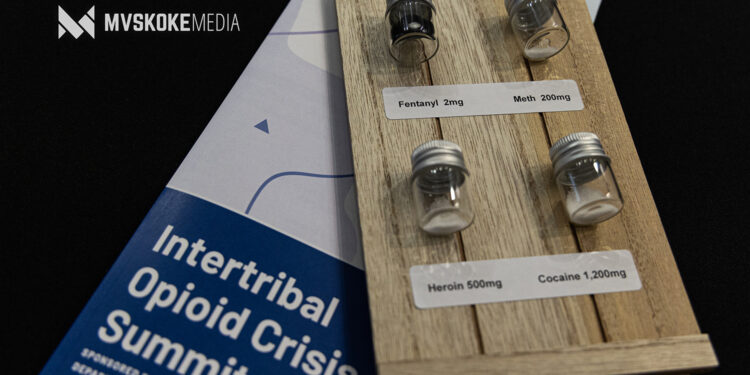GLENPOOL, Oklahoma – The Muscogee (Creek) Nation Department of Health Medication Assisted Treatment and Tribal Opioid Response (MAT | TOR) team held the first Intertribal Opioid Crisis Summit at the Glenpool Conference Center Feb. 13. This event provided information about the opioid crisis to Muscogee Nation departments as well as other tribal and state agencies.
Megan Lowry, MCNDH MAT | TOR Director, said “The MCNDH MAT | TOR team put the Intertribal Opioid Crisis Summit together in response to seeing a need from our patients about educating our tribal departments, working with other tribes, and fostering partnerships between state and tribal agencies to address the opioid crisis in our communities and families.”
According to the National Institute on Drug Abuse, “Opioids are a class of drugs that include the illegal drug heroin, synthetic opioids such as fentanyl, and pain relievers available legally by prescription, such as oxycodone (OxyContin), hydrocodone (Vicodin), codeine, morphine, and many others.”
The four main issues with the opioid crisis include fentanyl, the effect opioids have on our brains, overdoses, and lack of knowledge. Fentanyl is so cheap, getting into almost every street drug, and pressed into fake pills. It is also easily accessible because it is so cheap. Opioids disrupt the natural levels of dopamine, making it highly addictive. Fentanyl hijacks dopamine response making it 50-100 times higher than normal.
Youth are experimenting with opioids and overdosing. They need to know the dangers associated with drugs, how to get help, and what to do if someone overdoses. Tribal agencies do not fully grasp how common opioid use disorder is, how to combat it and help citizens overcome it.
According to DEA testing in 2022, 60% of counterfeit pills on the street contain a lethal amount of fentanyl, increasing 20% from 2021. When pills are manufactured on the streets, there is no way to determine how much fentanyl is in each one. The MAT | TOR team used the analogy of baking chocolate chip cookies to explain this a little easier.
“You cannot control how many chocolate chips go into each cookie, just like the amount of fentanyl in most street drugs cannot be controlled,” said Lowry.
A lethal dose of fentanyl is two mg, equivalent to five grains of salt. Because of the irregularities in counterfeit pills, recreational and regular users are at a higher risk of overdose.
People who are getting sober, coming out of detox, or that relapse have the highest risk of overdosing because their bodies no longer have the same tolerance they did when using regularly.
The best way to avoid fentanyl laced pills is by only taking medications filled at a pharmacy. Fentanyl can also be found in meth, heroin, street weed, and vapes.
“It all starts with having knowledgeable conversations and addressing the opioid crisis on our reservations,” Lowry said. “We wanted this summit to be educational and focus on getting out as much information as we could, the knowledge base from programs our tribe doesn’t have yet, and hear from state agencies that collect data and deal with the tribes in our state.”
Topics that were covered include paths to recovery, data and dissemination, Tribal Wellness Courts, substance use and the Indian Child Welfare Act, and addressing overdose and reducing harm.
Ways that attendees can implement what they learned include hiring peers (people who have been through recovery), having conversations about drugs especially opioids with youth, carrying narcan and knowing how to administer it, and knowing who to get in touch with if someone is fighting the disease of addiction and is ready for help.
This was the first year for the summit and there were around 200 in attendance. The majority of the 39 federally recognized tribes in Oklahoma were represented at the summit. The event was funded through grants and by the MCNDH.
The MAT | TOR team is now a year old consisting of five people, a Hospital Administrator, and the MCNDH Addiction Specialist, Dr. Reed. Although the program is new, the team stays busy working with patients, spreading awareness, and researching new ways to help those who are struggling. They are working to get Narcan into schools and out to cross deputized law-enforcement officers through Lighthorse police.
There will be another event on May 8 with more details to come. If there are any questions or someone needs help, the MCN MAT TOR intake number is (539) 286-3996.





